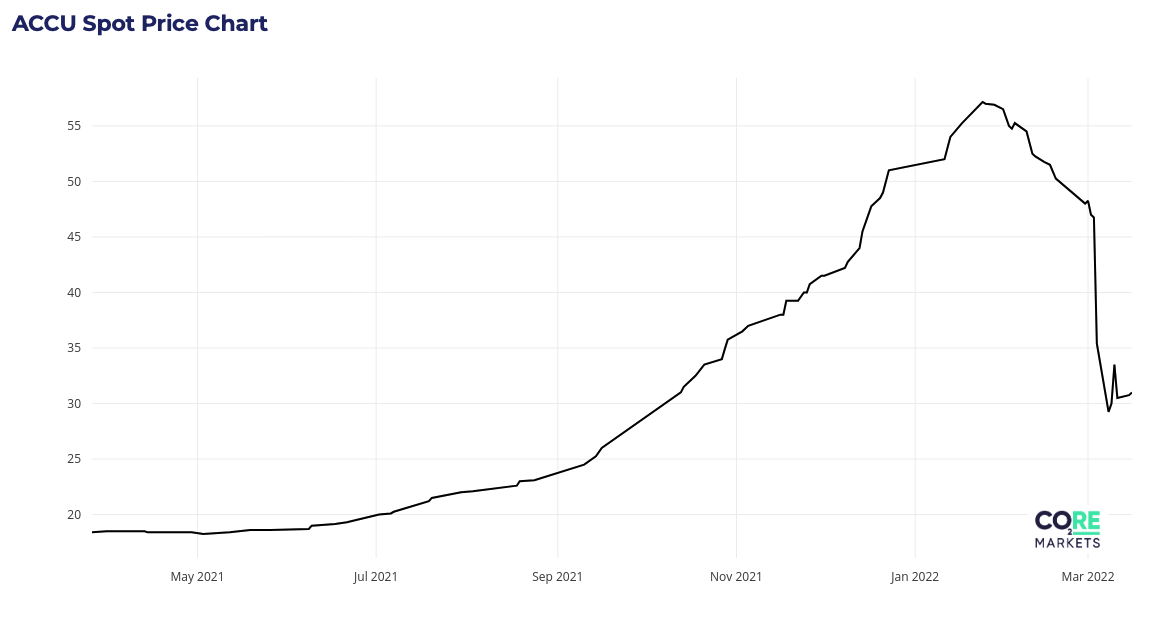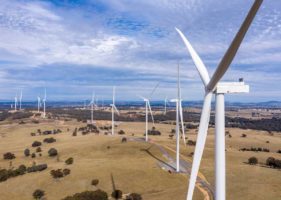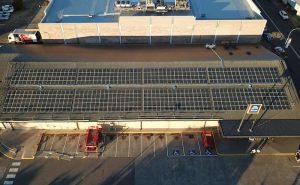The price of Australian Carbon Credit Units (ACCUs) has stabilised after crashing more than 40 per cent over the last few weeks, with the Clean Energy Regulator predicting the voluntary use of Australian offsets could tip over one million tonnes for the first time in 2022.
As RenewEconomy has detailed, the Regulator announced it would allow contracted ACCUs to be sold into the potentially more lucrative open market, rather than being handed over to the federal government under the Emissions Reduction Fund.
But with the projects freed from their contracts under the Emissions Reduction Fund, it creates the potential for a flood of carbon credits to be released into the open market – as much as 113 million credits – and a surprised market sent the price of the credits plunging dramatically in response.
Following the Regulator’s announcement, the price of ACCUs fell from around $47 per tonne to dipping below $30 per tonne – a 40 per cent collapse in the space of just a few days.
But according to carbon market analysts Reputex, ACCU prices appear to have stabilised – at least for the time being – at $31 per tonne, after a few weeks of volatility.

“While potential remains for buyers to return to the market, many participants remain watchful as they wait to see how a forecast large volume of new supply from existing fixed delivery contracts will be made available to the market,” Reputex said in a market update.
On Thursday, the Clean Energy Regulator, which administers both the federal government’s Emissions Reduction Fund and oversees the operation of the ACCU market, released its latest quarterly report on Australia’s carbon markets.
The Regulator said it expected voluntary cancellations of ACCUs to reach 1.1 million tonnes in 2022 – driven primarily by companies using the credits to fulfil their ‘carbon neutral’ certifications under the Climate Active program.
The Regulator said that the financial sector had been leading the growth in demand for ACCUs.
“The finance sector has been particularly active, accounting for 70 per cent of cancelled volume in Q4 2021,” the Regulator’s latest quarterly carbon market report says.
“Financial entities are both offsetting organisational emissions, as well as starting to offer financial products and services targeted at the carbon market, such as carbon offsetting, climate targeted managed funds, or carbon offset based financial derivative instruments. As the carbon market matures, demand from the finance sector is likely to grow further.”
The voluntary market for Australian carbon credits has grown steadily over the last few years, with around 475,000 units voluntarily cancelled in 2019. Since then, the market has doubled in size, with more than 950,000 units voluntarily cancelled in 2021.
The Regulator has said that it expects the voluntary demand to continue to grow as more and more businesses make efforts to reduce emissions in line with their own voluntarily set climate targets and could see major corporate emitters overtake the federal government as the largest buyers of Australian offsets.
“With a growing number of private and state and territory entities choosing to offset their emissions, the increasing demand for ACCUs is expected to be approximately 1.1 million units in 2022,” the report adds.
While the voluntary carbon market has shown strong year-on-year growth, the expected annual demand is potentially dwarfed by the 12 million ACCUs that could be released from contracts in 2022 alone.
It raises uncertainty about the future of Australia’s fledgling carbon market, as well as the future of the Emissions Reduction Fund, which has up to $4.5 billion in funds available to buy carbon abatement.
A spokesperson for the Clean Energy Regulator told RenewEconomy that while it had invested significant effort in growing the voluntary market for Australian carbon credits, it still expected to re-commit any funding freed up from the Emission Reduction Fund contracts back into “emissions reduction initiatives”.
“[Angus Taylor] has confirmed that any funds received under this process will be reinvested in the ERF or new emissions reduction initiatives,” he spokesperson said.
“Any committed ERF funding released back to the Clean Energy Regulator as a result of contract holders choosing to exit their delivery obligations will be made available to support new ERF projects.
“In recent years, the Clean Energy Regulator has taken steps to support and grow the private market for ACCUs.
“Reforms include introducing optional delivery contracts to de-risk investment in ERF projects, an accelerated program to develop new ERF methods to unlock additional ACCU supply, and piloting the Corporate Emissions Reduction Transparency (CERT) report to enhance transparency and accountability in companies’ net zero emissions planning.
“Work is also underway to implement an Australian Carbon Exchange.”
The Regulator also confirmed it would continue to run auctions for the purchase of ACCUs, with the next scheduled for April. However, projects participating in the auction will likely pursue ‘optional delivery’ contracts which still allow ACCUs to be sold into the open market without the need to pay a contractual penalty.









